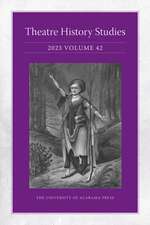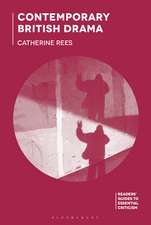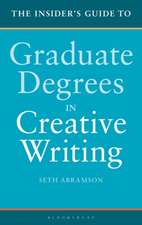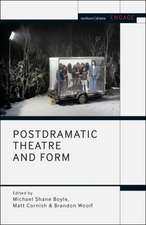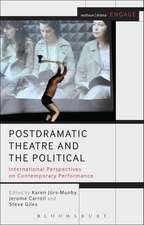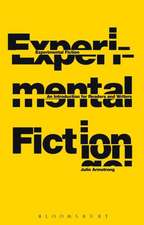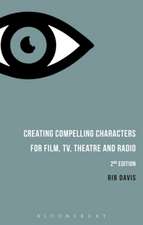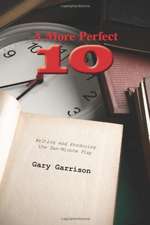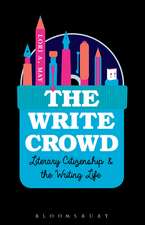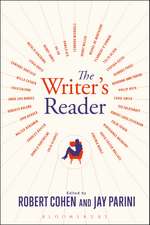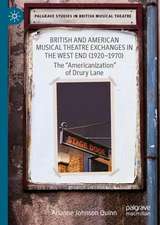How to Write About Theatre: A Manual for Critics, Students and Bloggers
Autor Mark Fisheren Limba Engleză Paperback – 26 aug 2015
| Toate formatele și edițiile | Preț | Express |
|---|---|---|
| Paperback (1) | 177.77 lei 3-5 săpt. | +42.17 lei 10-14 zile |
| Bloomsbury Publishing – 26 aug 2015 | 177.77 lei 3-5 săpt. | +42.17 lei 10-14 zile |
| Hardback (1) | 567.33 lei 6-8 săpt. | |
| Bloomsbury Publishing – 26 aug 2015 | 567.33 lei 6-8 săpt. |
Preț: 177.77 lei
Preț vechi: 206.99 lei
-14% Nou
Puncte Express: 267
Preț estimativ în valută:
34.02€ • 35.39$ • 28.09£
34.02€ • 35.39$ • 28.09£
Carte disponibilă
Livrare economică 22 martie-05 aprilie
Livrare express 11-15 martie pentru 52.16 lei
Preluare comenzi: 021 569.72.76
Specificații
ISBN-13: 9781472520548
ISBN-10: 1472520548
Pagini: 296
Dimensiuni: 129 x 198 x 18 mm
Greutate: 0.3 kg
Editura: Bloomsbury Publishing
Colecția Methuen Drama
Locul publicării:London, United Kingdom
ISBN-10: 1472520548
Pagini: 296
Dimensiuni: 129 x 198 x 18 mm
Greutate: 0.3 kg
Editura: Bloomsbury Publishing
Colecția Methuen Drama
Locul publicării:London, United Kingdom
Caracteristici
The only book targeted specifically at the theatre critics to break down the process of reviewing theatre in a manageable, accessible and coherent way
Notă biografică
Mark Fisher is one of Scotland's foremost commentators on the arts. With over 25 years' experience, he is the Scottish theatre critic for The Guardian, a former editor of The List and a freelance contributor to Variety, The Scotsman and Scotland on Sunday. He is the author of The Edinburgh Fringe Survival Guide ("A wonderfully practical but also inspirational book full of good advice" - Lyn Gardner, The Guardian) and the co-editor of Made in Scotland, an anthology of plays published by Methuen Drama.
Cuprins
1. Introduction2. How to Learn from Critics of the Past3. How to Take on Different Critical Styles4. How to Write for Your Readers5. How to Do Your Research6. How to Find Your Voice7. How to Write the First Sentence8. How to Structure a Review9. How to Write in the Moment10. How to Write Opinions11. How to Give Star Ratings12. How to Write About Acting13. How to Write About Plays14. How to Write About the Production15. How to Write About the Audience16. How to Write About Context17. How to Write About Emotions18. How to Write About Your Bias19. How to Write About Culture, Society and Politics20. How to Put Everything Together21. Index
Recenzii
A perfect introduction to what could be a lifetime of pleasure in and around theatres . Mark Fisher has written an intelligent and insightful manual "for critics, students and bloggers" that will help those studying theatre criticism to understand their chosen trade and pursue it more effectively.
Whatever else you read this autumn, Mark Fisher's new book How to Write About Theatre (Bloomsbury) has to be top of the list. If you've ever tapped out so much as a tweet about a show (which is in effect a mini self-published review), then this is the book for you. . . . Fisher very helpfully breaks down writing about theatre into two ways of dealing with things such as audience, production, emotions, context and more. He even discusses star ratings, writing about your own bias . . . and how to write about culture, society and politics. Along the way this accessible, moderate, helpful and very thorough book suggests learn-the-ropes exercises. Whether you're a highly experienced writer about theatre or a raw beginner desperate for advice and training, there is something for you here.
In one of his many succinct definitions, Fisher suggests the critic's job is to "write well, think clearly and entertain". This book can teach you how to do this - and a lot more. Highly recommended.
[An] entertaining and informative must-read for budding, blooming or even slightly bloomed theatre critics. It is clearly written, widely researched and in the typically even handed and generous style of the author.
This book is a useful tool for both experienced writers/critics and novices alike. In it Fisher manages to balance some insightful commentary on the history of criticism with a well structured guide to writing ... Fisher's book is an approachable yet informed text, it provides detailed context and content while maintained an accessible and engaging format.
A comprehensive, astutely researched, academic guide to theatre criticism ... Fisher offers pertinent advice ... [with] some wonderful quotations from archive and contemporary reviews to illustrate how to write with conviction ... [A]n inspirational, constructive manual for all theatre professionals.
Undoubtedly, one of the most successful books on theatre criticism.
In approachable and fastidious prose, Fisher guides the reader through twenty chapters in which he demonstrates how one can perform theatre criticism that is analytical and accessible, regardless of the intended audience or medium of delivery . Fisher has given us a short (but analytical) view into the debates, the schools of thought, and the rationale for different approaches to theatre criticism. Because social media has made us all members of the public sphere, the information is invaluable for students, journalists, scholars, tweeters, bloggers, and teachers.
How to Write about Theatre is a great source to teach theatre students about the history of criticism as a profession, and about what publishing theatre criticism shares with the process of making theatre. The strength of the book is how Mark Fisher repeatedly frames the act of publishing criticism as a performance . Fisher prepares the reader to consider the social purpose and artistic dimensions of their writing so that they see theatre criticism as an art. This book focuses on the fundamentals of crafting an engaging argument and identifying one's potential audience in ways that will resonate with theatre students. Fisher's text will serve them well, because it trains their capacity as writers in fun and creative ways and illustrates how their training in performance can inform their writing . Students who utilize this book to learn how critics might analyze theatre will be prepared to think more critically about the productions they work on, as well as their own writing . Fisher's text teaches students how to write journalistic arts criticism, but it is a valuable resource with straightforward advice for any student learning how to translate a theatrical event into writing.
A wry and useful how-to for the newest would-bes working in this changing and maddeningly difficult area of theatre.
Whatever else you read this autumn, Mark Fisher's new book How to Write About Theatre (Bloomsbury) has to be top of the list. If you've ever tapped out so much as a tweet about a show (which is in effect a mini self-published review), then this is the book for you. . . . Fisher very helpfully breaks down writing about theatre into two ways of dealing with things such as audience, production, emotions, context and more. He even discusses star ratings, writing about your own bias . . . and how to write about culture, society and politics. Along the way this accessible, moderate, helpful and very thorough book suggests learn-the-ropes exercises. Whether you're a highly experienced writer about theatre or a raw beginner desperate for advice and training, there is something for you here.
In one of his many succinct definitions, Fisher suggests the critic's job is to "write well, think clearly and entertain". This book can teach you how to do this - and a lot more. Highly recommended.
[An] entertaining and informative must-read for budding, blooming or even slightly bloomed theatre critics. It is clearly written, widely researched and in the typically even handed and generous style of the author.
This book is a useful tool for both experienced writers/critics and novices alike. In it Fisher manages to balance some insightful commentary on the history of criticism with a well structured guide to writing ... Fisher's book is an approachable yet informed text, it provides detailed context and content while maintained an accessible and engaging format.
A comprehensive, astutely researched, academic guide to theatre criticism ... Fisher offers pertinent advice ... [with] some wonderful quotations from archive and contemporary reviews to illustrate how to write with conviction ... [A]n inspirational, constructive manual for all theatre professionals.
Undoubtedly, one of the most successful books on theatre criticism.
In approachable and fastidious prose, Fisher guides the reader through twenty chapters in which he demonstrates how one can perform theatre criticism that is analytical and accessible, regardless of the intended audience or medium of delivery . Fisher has given us a short (but analytical) view into the debates, the schools of thought, and the rationale for different approaches to theatre criticism. Because social media has made us all members of the public sphere, the information is invaluable for students, journalists, scholars, tweeters, bloggers, and teachers.
How to Write about Theatre is a great source to teach theatre students about the history of criticism as a profession, and about what publishing theatre criticism shares with the process of making theatre. The strength of the book is how Mark Fisher repeatedly frames the act of publishing criticism as a performance . Fisher prepares the reader to consider the social purpose and artistic dimensions of their writing so that they see theatre criticism as an art. This book focuses on the fundamentals of crafting an engaging argument and identifying one's potential audience in ways that will resonate with theatre students. Fisher's text will serve them well, because it trains their capacity as writers in fun and creative ways and illustrates how their training in performance can inform their writing . Students who utilize this book to learn how critics might analyze theatre will be prepared to think more critically about the productions they work on, as well as their own writing . Fisher's text teaches students how to write journalistic arts criticism, but it is a valuable resource with straightforward advice for any student learning how to translate a theatrical event into writing.
A wry and useful how-to for the newest would-bes working in this changing and maddeningly difficult area of theatre.

